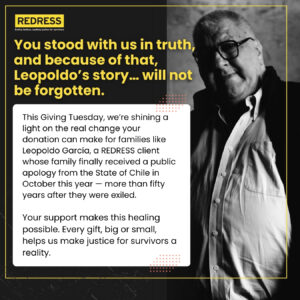
Al-Hawsawi case: on 17-year anniversary of his detention by US forces, case against Lithuania reaches significant landmark
Today marks the 17th anniversary of Mustafa Al-Hawsawi’s detention in Pakistan and handover to US forces, which subjected him to torture and held him in secret detention as part of a CIA programme which operated several ‘black sites’ in Europe.
Detailed analysis of publicly available evidence on the CIA programme has found that Mustafa was secretly held in a CIA ‘black site’ in Lithuania between February or October 2005 and March 2006, before being rendered to Guantánamo Bay.
In 2013, REDRESS and the Human Rights Monitoring Institute (HRMI) submitted a complaint in Lithuania calling for an investigation into allegations that Mustafa was illegally transferred to, and secretly detained and tortured, in Lithuania. The investigation has never been concluded and Lithuania has consistently refused to recognise that Mustafa is a ‘victim’ of any crime. In December 2016, REDRESS filed a complaint against Lithuania at the European Court of Human Rights, after local remedies were exhausted.
Following Lithuania’s response to that complaint, on 31 January 2020 REDRESS filed its detailed comments on the State response. Our submission reiterates the contents of the claim made in December 2016, which argued that Lithuania has violated the following Articles of the European Convention on Human Rights: Article 2 (the right to life – on the basis that there was a real risk that allowing his transfer to Guantánamo would result in him being subjected to the death penalty); Article 3 (the right not to be tortured, and the procedural right for any torture to be investigated); Article 5 (the right to liberty and security); Article 6 (the right to fair trial), Article 8 (the right to respect for private and family life), and Article 13 (the right to an effective remedy in Lithuania). Our submission also:
- Stresses that Lithuania has legal responsibility for what happened to Mustafa in Lithuania, and that the European Court of Human Rights therefore has jurisdiction to consider the issues raised;
- Provides some updated evidence to support his claim (for example, confirmation that the investigation in Lithuania has still not been concluded, and updated information about Mustafa’s ongoing medical conditions); and
- Sets out the ongoing impacts on Mustafa of his detention in Lithuania (and subsequent rendition to Guantánamo) and provides details about his claim for reparations.
The case builds on another similar case brought against Lithuania decided in May 2018 (Abu Zubaydah v Lithuania), and appears likely to be the last of the CIA rendition cases decided by the European Court of Human Rights.
Mustafa has been held in Guantánamo Bay since September 2006 (the first time US officials acknowledge his detention), where he faces capital charges before a US Military Commission for his alleged involvement in the September 11, 2001 attacks in the USA. He has been characterised as a High Value Detainee (HVD).
Amongst the various forms of torture which Mustafa suffered whilst in CIA detention were so-called “Enhanced Interrogation Techniques” including water-dousing (a technique similar to water-boarding), walling, attention grasps, facial holds, cramped confinement, psychological pressures and sleep deprivation.
Mustafa now suffers from a number of serious medical conditions, including rectal prolapse, anal fissures, and Hepatitis C, conditions he did not have previously.
The United States Senate Torture Report – the most comprehensive examination of the CIA’s Torture programme – indicates that while Mustafa was held in Lithuania he required emergency medical care, which was delayed because he was denied access to a local hospital.
Throughout his three and a half years’ secret detention (from 2003 to 2006) – including the time he was detained in Lithuania – he was not allowed access to a lawyer or to independent monitors (such as the International Committee of the Red Cross).
He was detained outside the protection of the law in conditions that amounted to enforced disappearance.
Read more about the case here.
Photo credit: PO2 Kilho Park.

